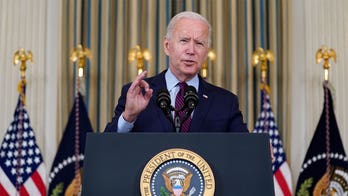A Wisconsin judge on Tuesday ordered "no further implementation" of the Gov. Scott Walker's budget repair bill that limits collective bargaining rights.
Dane County Circuit Judge Maryann Sumi said that her earlier restraining order saying the law shouldn't be enacted had either been ignored or misinterpreted.
Sumi stopped short of saying the law was not already in effect. She said she will take more testimony on that issue.
The Legislative Reference Bureau posted the law on a legislative website Friday, leading Walker's administration to declare the law was in effect.
Sumi revised her original March temporary restraining order blocking the secretary of state from publishing the law, which is typically the last step before it becomes effective.
Sumi's ruling delivers a setback to Walker and his administration while Democrats rejoiced.
Earlier Tuesday, debate raged from Wisconsin state Supreme Court justices to law professors, on whether Walker is law and is in effect.
It states the obvious to say Wisconsin is now a big convoluted, partisan mess, but it is. Here is the skinny on what is happening: Dane County District Attorney Ismael Ozanne, who is a Democrat, and Assembly Minority Leader Pete Barca, also a Democrat, filed a court challenge to the budget relief bill. The challenge argues that Wisconsin Republicans violated the open meetings laws but since that has not entered into the argument, set that aside for the moment.
As the open meetings suit was pending, Circuit Court Judge Maryann Sumi issued a temporary restraining order that prevented Secretary of State Ken LaFollete from publishing the law, now known as Act 10. Publication of the law is the last step to putting a bill into effect, and Democrats argue that the law is not in effect until LaFollete issues the publication.
However, another outlet can publish the law: the Legislative Review Board. That is exactly what it did last Friday, leaving Wisconsin Republicans to argue that the law is in effect. The Department of Administration has even begun implementing the part of the law where deductions for health care and pensions are made from the paychecks of state employees.
Sumi ordered a hearing Tuesday morning to decide if LaFollete should be enjoined from publication until the open meetings case is decided. But if the law is already in effect, the injunction is moot. So the focus of the hearing was changed to answer the question of whether the law is in effect.
The hearing itself was pretty boring, filled with legal language and debate over the definition of publication. The most interesting moments came as LaFollete, a Democrat, argued that Assistant Attorney General Maria Lazar did not represent his office. The subtext, of course, was that she is from a Republican-run office and is on the other side of the battle line.
If Sumi enjoins the law until the hearing on the open records complaint, its status still remains uncertain because no one has ever seen a scenario in which the secretary of state does not publish the law and another body does. If Sumi vacates the injunction, the law is undisputedly in effect.
Now, back to the challenge over the open meetings law. There is already a request for Wisconsin's Supreme Court to hear the case and this is where the partisan rancor gets really bitter and political.
One of the seats on the Supreme Court is up for election. The incumbent David Prosser Jr. was a Republican when he served in the assembly. His campaign once issued a press release stating he would complement Walker as a justice on the court, meaning he is now linked to Walker in the public arena. He is also the subject of attack ads from the shadowy leftist organization Greater Wisconsin Committee.
"I really am a marked man. Not a direct target, but I am the victim of a drive-by shooting," Prosser said.
His challenger, JoAnne Kloppenburg, has the backing of the unions. "They're supporting me precisely because I will be independent and impartial on the court," she said.
The reality, however, is that conservatives hold sway in the Wisconsin Supreme Court by a margin of 4-3 on the seven-person court. Liberals are now energized to change the majority in the court in part to influence a ruling on Walker's budget and also to demonstrate an angry backlash for a law they don't like.
"It is extremely unfortunate that this has been turned into a referendum on the budget repair bill. I think that raises serious due process questions," Marquette University Law Professor Rick Esenberg said.
So the fight is energized in the courts and at the ballot box with Wisconsin voters bitterly divided, and Wisconsin liberals energized to change the make-up of a state Supreme Court in anticipation of a desired outcome for a case that has not even been accepted by the court yet.
"It is an effort by some people to politicize this court, completely change the nature of the court and if it succeeds it will destroy the judicial independence of this institution," Prosser said.
The Associated Press contributed to this report.




